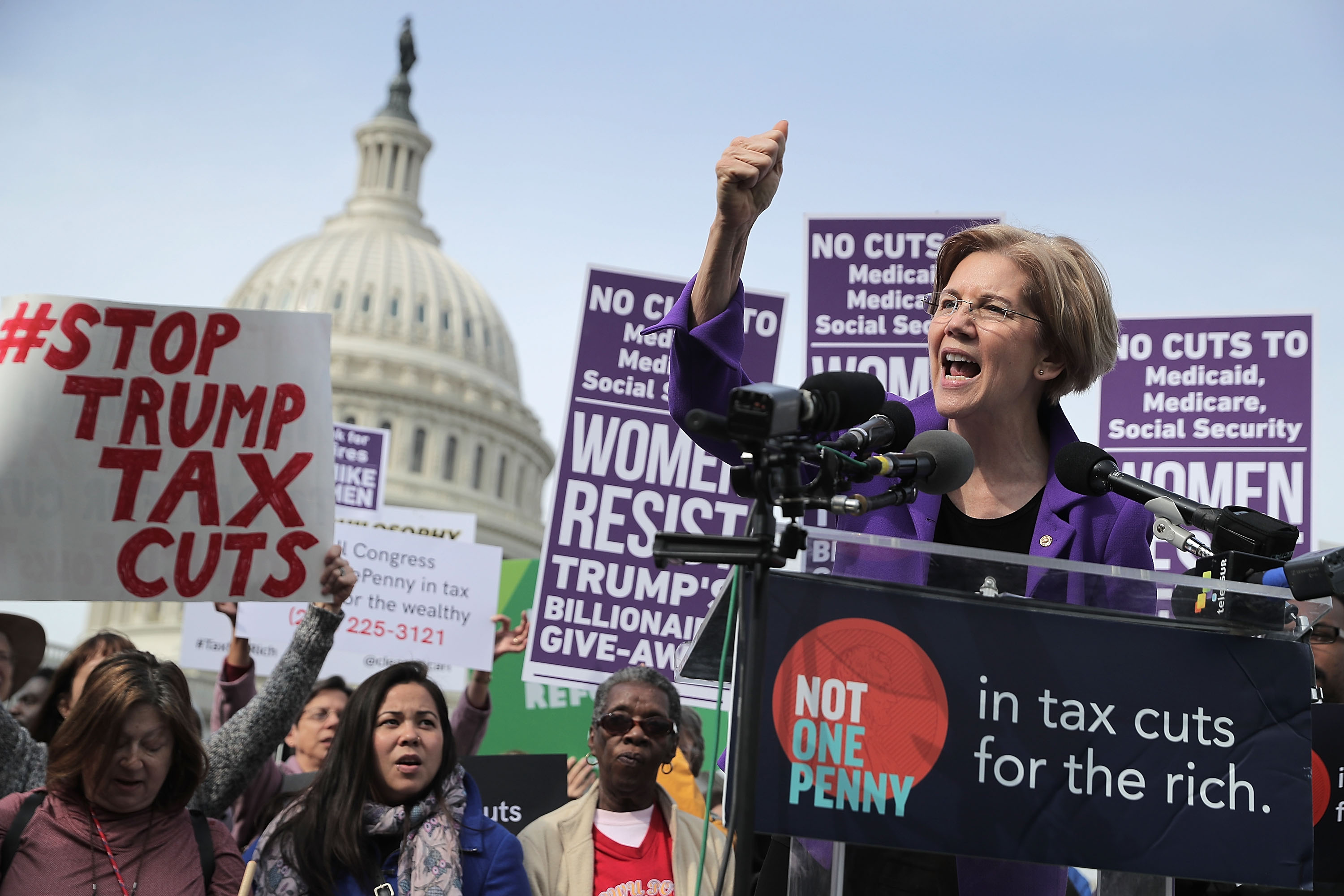The 2016 election of Donald Trump shattered political orthodoxies. Now that fusionism — the philosophy that combined libertarian economics with conservatism — is collapsing, conservatives will have to adapt to new fiscal, political, and social realities.
Given the recent discussions of taxation during this election year, conservatives need to revisit the possibility of increasing taxes on the rich. Not only would such a policy assist us in achieving fiscally conservative policy goals, but, more importantly, it would help us conserve social order.
There are many objections to this idea. Many will say they already do pay more. Michael Strain over at Bloomberg makes this case. However, Strain relies on some fuzzy math, designed to obfuscate rather than illuminate. For one thing, Strain’s analysis relies solely on federal taxes. But the New York Times’ David Leonhardt pointed out that we need to include state and local taxes.
As usual, the main question is, who are we talking about, exactly? Others have pointed to the overall tax structure to prove that “the rich” do pay higher taxes. However, when we isolate the true elite — often numerated as the top 400 wealthiest — it’s clear that they pay a lower effective rate across the board than any other group. (RELATED: Opinion: No, The Rich Don’t Pay Fewer Taxes Than The Rest Of Us)
Economists Saez and Zucman noted that while the top 400 pay an effective rate of 23%, less than 1% of their combined total income, the rest of Americans pay anywhere from 25% to 30% from combined federal, state and local taxes. Furthermore, the tax code rewards deductions available only to the elite. These deductions amplify the unfairness of a system that already prioritizes capital gains over middle-class wages. While on paper, one can argue the American tax code makes the elite pay a significant amount in taxes, in reality the system is largely rigged in their favor.

Sen. Elizabeth Warren (D-MA) addresses a rally against the Republican tax plan outside the U.S. Capitol November 1, 2017 in Washington, DC. (Photo by Chip Somodevilla/Getty Images)
The second objection comes in the form of a concern for economic growth: Taxing the rich keeps them from investing their money in job-creating enterprise. However, this is simplistic in the extreme. Given how low elite tax rates truly are, even a 25% increase in the effective tax rate is unlikely to be noticed in the slightest. Additionally, there’s a wealth of literature after tax reforms in the 1980s that show, after a certain point, tax cuts do not provide any real positive effect on the economy. If anything, higher taxes on the elites often have little to no negative impact at all. (RELATED: Ocasio-Cortez’s Mom Says She Had To Leave New York Due To High Taxes)
Not only are the common objections almost entirely without merit, there is a conservative case for higher taxes on the rich. This case relies on a few things, the first being fiscal responsibility: The U.S. federal debt is above $22 trillion. It is beyond the ability of human mental comprehension. The tax legislation in 2017 made this worse by adding to our annual deficit. If we are going to have discussions about a return to “first principles,” we would do well to remember Edmund Burke’s words on debt:
“[T]he public, whether represented by a monarch or by a senate, can pledge nothing but the public estate; and it can have no public estate except in what it derives from a just and proportioned imposition upon the citizens at large.”
Putting America $22 trillion in debt is unconscionable. We cannot rely on any more voodoo economics to get us out of this mess. We need to raise revenues immediately to resolve what has become a national crisis. Tapping the middle classes and working Americans is both counterproductive and unjust. The elites need to put some skin in the game and shoulder more of the burden.

A limousine sits parked along a Manhattan street on November 30, 2017 in New York City. (Photo by Spencer Platt/Getty Images)
The second part of the conservative case for taxing the rich is this: We should foster in the elite a renewed sense of noblesse oblige, and their responsibility to defend the social order. At the end of the day, the discussions of whether or not members of Jeff Bezos’s brunch circle technically pay a slightly higher rate than the middle class is largely irrelevant to the average American. For years, the discontent in America has been bubbling and it has only begun to boil over. Americans believe the economy is rigged, and this view is felt most strongly by the future voters of America.
By contrast, the elites have largely adopted a political worldview that is dedicated to maximizing their own wealth and autonomy. America is consumed by mutual alienation. This dual trend points toward disaster for America. The residents of flyover country view the rich as out-of-touch elitists who aren’t invested in the system. The elite view the working class as takers who don’t contribute anything. If unchecked, this will threaten the long-term survival of the United States. (RELATED: ‘That’s Exactly What I Believe’ — Sanders Doubles Down On Plan To ‘Tax Billionaires Out Of Existence’)
An increased tax rate will help sustain the long-term fiscal health of the nation, but it can also go a long way toward helping us invest back into the United States. Additionally, by co-opting a few parts of the Democrats’ agenda, conservatives can seriously cut into the support of the progressive left, which is not overwhelmingly popular, but exploits widespread feelings of inequity. Conservative statesmen like Bismarck can be a useful guide. Lastly, starting with a more reasonable tax rate on the elites, we can renew a sense of obligation on the part of America’s wealthy. Conservatism used to emphasize duties as much as it did rights. Those of us who are beneficiaries of our ancestors’ and predecessors’ hard work should feel an obligation to our fellow countrymen and in particular to those less fortunate then them. Noblesse oblige — literally nobility obligates — is not left-wing demagoguery, but an established conservative and Western principle. It does not advocate class warfare, but rather civic duty.
Making the elites pay more in taxes is not a panacea for every ill in Washington, fiscal or social. But it would be a useful first step in tackling crippling deficits, social tensions and decreasing civic trust.
Joseph S. Laughon is a political thought graduate of Concordia University, Irvine and a specialist in the logistics industry. He lives in Los Angeles, where he writes on culture, religion, politics and national security. His writing can be found at the Kirk Center, Human Events and Musings On the Right, among other places.
The views and opinions expressed in this commentary are those of the author and do not reflect the official position of the Daily Caller News Foundation.
All content created by the Daily Caller News Foundation, an independent and nonpartisan newswire service, is available without charge to any legitimate news publisher that can provide a large audience. All republished articles must include our logo, our reporter’s byline and their DCNF affiliation. For any questions about our guidelines or partnering with us, please contact licensing@dailycallernewsfoundation.org.


